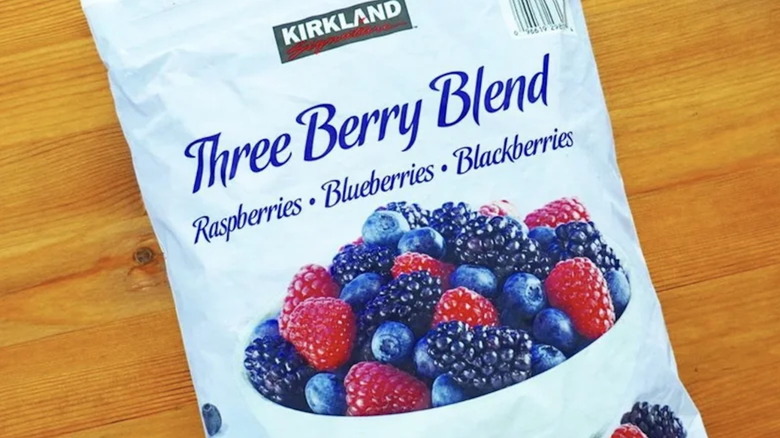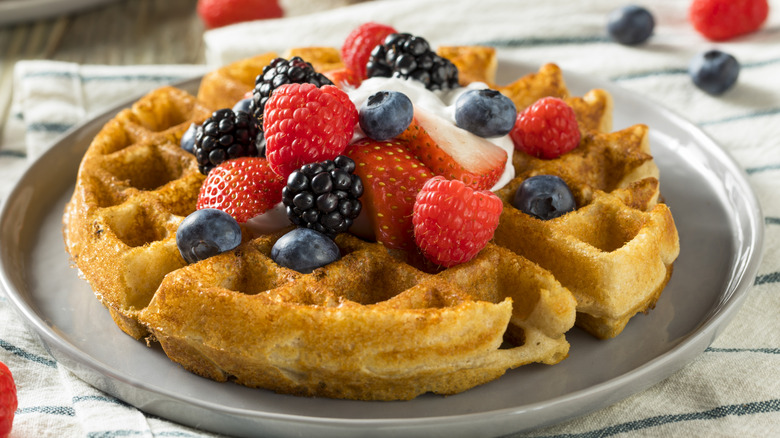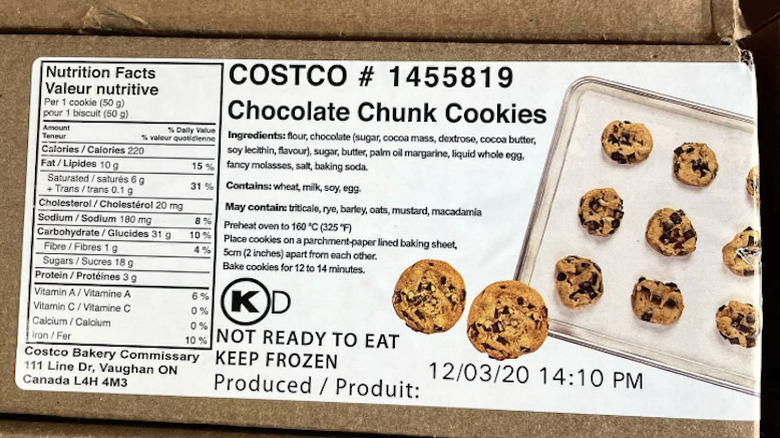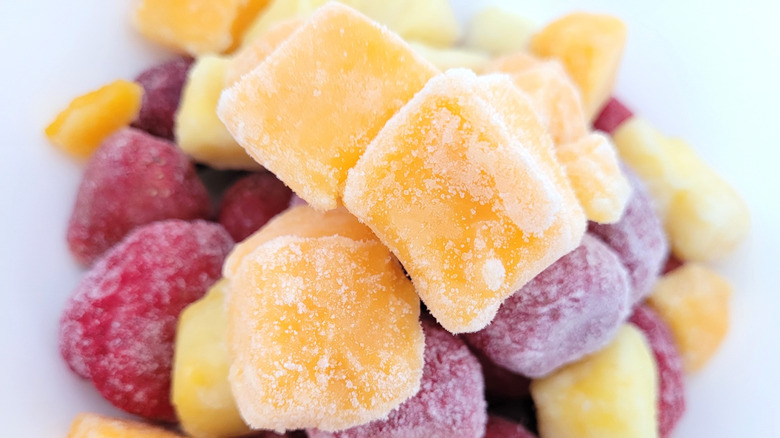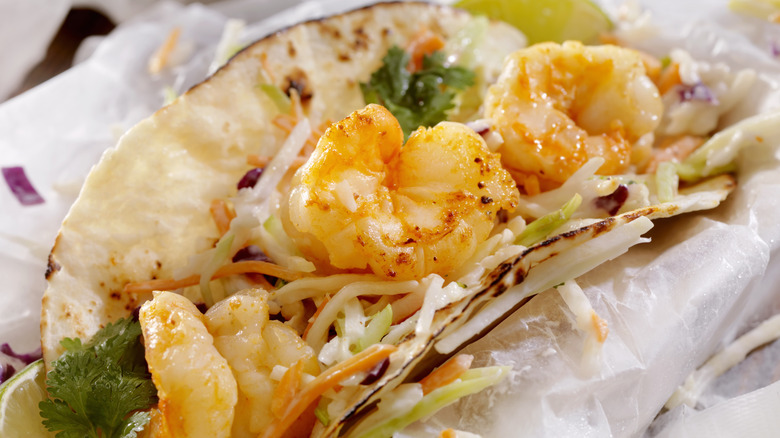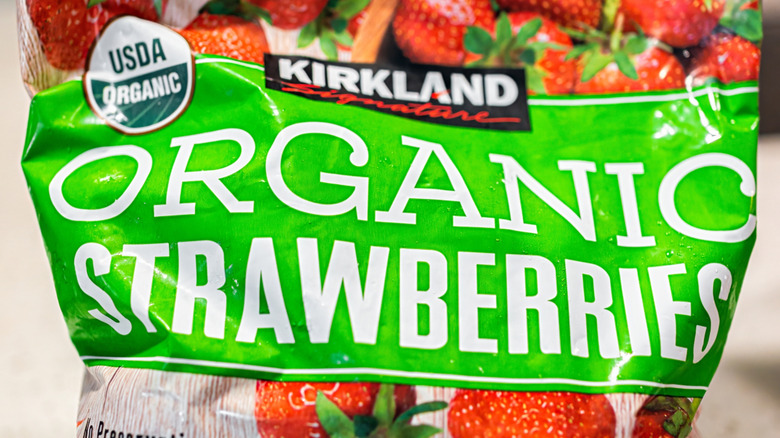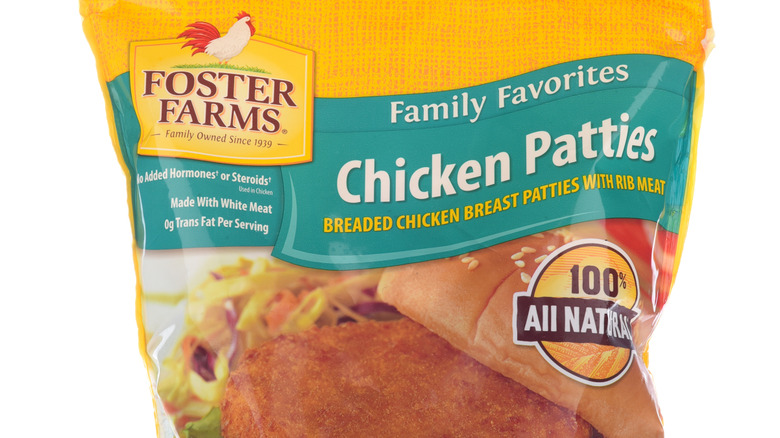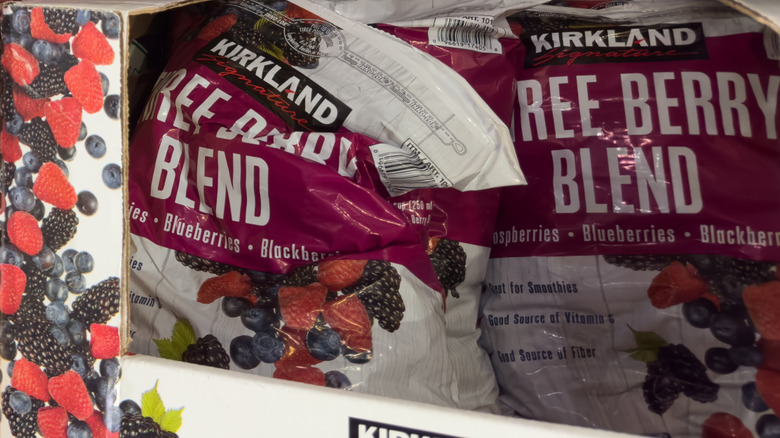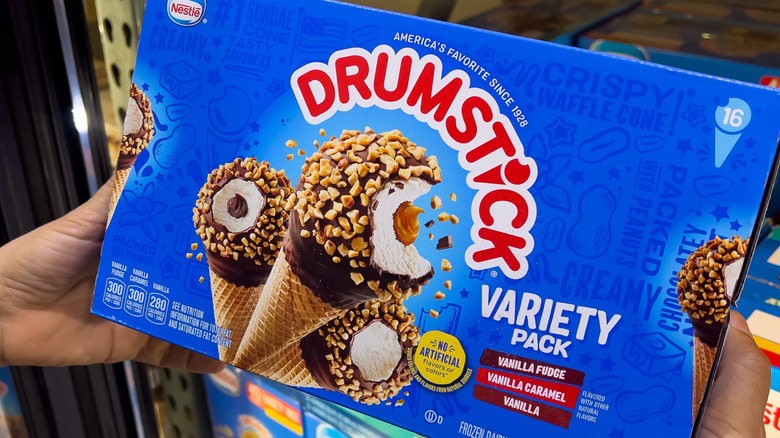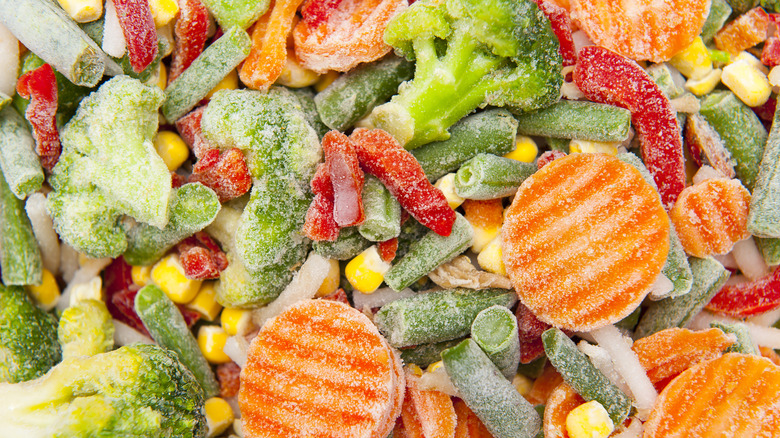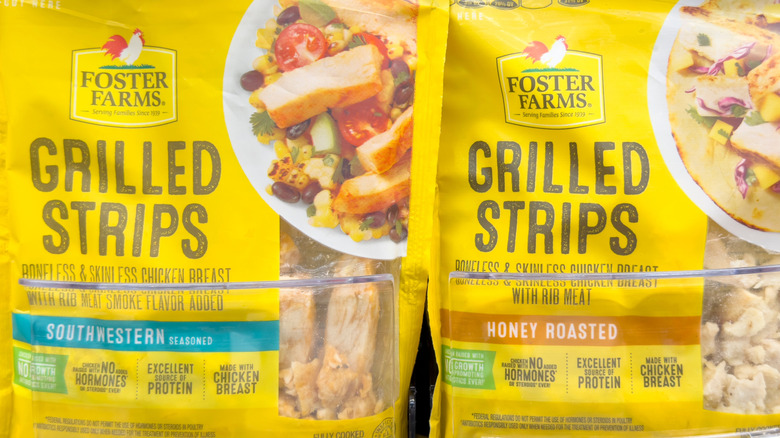Costco Frozen Food Recalls That Affected Millions
Frozen food is nothing short of a miracle of science. Packagers can preserve fresh produce or create entire meals that can last for months or even years if kept cold enough. Another remarkable system gets these frozen foods to millions of American homes: club warehouse stores such as Costco. Members navigate carts through their massive local stores to stock up on all the necessities and treats their families may need. They put a lot of trust in Costco to make sure that everything they buy, serve, and consume is safe and sound.
But the supply chain is complicated, with a lot of different companies and elements along the way. Any one of them can — and sometimes does — go awry, sending tainted, contaminated, and hazardous food into hundreds of Costco club stores around the country. When this happens, Costco works with manufacturers and federal government agencies to get the affected products out of stores and away from customers. Here are the most monumental recalls to ever hit the frozen food section of Costco.
El Monterey taquitos, Rana pastas, and Red's mini burritos were all recalled in 2024
BrucePac is an industrial supplier that provides chicken and other meats to a number of companies. In October 2024, an inspection of a BrucePac processing plant in Durant, Oklahoma, discovered that meat and poultry made there may have been infected with Listeria monocytogenes, a bacterium that can lead to a foodborne illness colloquially known as listeria.
Thanks to the nature of BrucePac's business, the possibly tainted chicken made its way into numerous food items, including El Monterey Mexican Grill Chicken & Cheese Taquitos, sold in bulk quantities at Costco stores. Also including BrucePac pre-cooked chicken, and thus subject to recall, were two frozen pasta dinner meals sold at Costco: Rana Chicken Truffle Carbonara and Rana Tagliatelle Grilled White Chicken & Portobello Mushroom Sauce.
A daunting recall effort ensued that grew to comprise 11.7 million pounds of chicken, found in products sold at numerous retail chains and used institutionally in school cafeteria meals. Another frozen item sold in bulk at Costco was recalled: Red's Southwestern Grilled Chicken Mini Burritos. No illnesses linked to the BrucePac and Costco recall were initially reported, but a wrongful death lawsuit was later filed regarding a recalled pasta product sold at Walmart.
Krusteaz Belgian Waffles were among hundreds of recalled waffle products in 2024
Krusteaz is one of the leaders in the market of convenience waffles, producing lines of dry mixes and heat-and-eat frozen varieties through its parent company, TreeHouse Foods. In 2024, Costco stocked 24-item boxes of Krusteaz Belgian Waffles in its network of warehouse stores. At first, that popular item wasn't listed among the affected products when TreeHouse Foods announced in October 2024 that Listeria monocytogenes had been detected at a production facility in Brantford, Ontario, via a regularly scheduled test. Fearing contamination, TreeHouse Foods issued a modest recall. Four days later, the company expanded the pullback to include well over 200 varieties of potentially tainted frozen waffles, including the 3.4-pound boxes of Krusteaz Belgian Waffles on sale at Costco.
Neither the FDA, Costco, nor TreeHouse Foods ever announced exactly how many units or pounds of Krusteaz Frozen Waffles were subject to recall or what quantity of potentially listeria-infested waffles wound up returned. Fortunately, no illnesses linked to the product were ever reported. That's a good thing, as listeria can cause a particularly serious form of food poisoning called listeriosis, which can lead to gastrointestinal symptoms, fever, and muscle stiffness. In particularly severe cases, it can even prove fatal — especially in compromised segments of the population, such as children, the elderly, or the chronically ill.
Plastic contamination forced a 2024 recall of Kodiak Power Waffles
TreeHouse Foods produces frozen waffles for the house brands of some of the most trusted grocery stores in America as well as a variety of name-brand breakfast goods. Among the company's brands is Kodiak Cakes, a line of frozen waffles fortified with protein that was involved in two recalls in 2024.
Not only were several kinds of Kodiak waffles included in the recall for hundreds of TreeHouse products after the aforementioned discovery of Listeria monocytogenes in October 2024, but some waffles were also the target of a separate recall a month earlier. In September 2024, Costco pulled 40-count boxes of Kodiak Power Waffles in the buttermilk and vanilla flavor from its icy cold shelves. Just one lot with a particular code and time stamp was found to be at fault, but the frozen waffles had already been distributed to Costco stores in the Midwest and surrounding areas, including Illinois, Indiana, Iowa, Kansas, Kentucky, Michigan, Minnesota, Missouri, Nebraska, North Dakota, Ohio, South Dakota, and Wisconsin.
While no illnesses were reported, Kodiak Cakes bosses said that the recall had to take place because the waffles, purchased in July and August 2024, had potentially become compromised by something inedible. Small bits of plastic film used in production and packaging had found their way into the waffles themselves.
Chocolate Chunk Frozen Cookie Dough was potentially contaminated with salmonella in 2024
Delicious though it may taste, raw cookie dough isn't necessarily fit for human consumption. It's made with flour and eggs, which can harbor harmful E. coli and salmonella bacteria, respectively, in their uncooked states. That possibility became a reality in May 2024, when a Rise Baking Company subsidiary, South Coast Baking, voluntarily initiated a recall of its frozen cookie dough, distributed to big chains such as Panera Bread, Sam's Club, and Costco.
Within a month, the Food and Drug Administration had deemed the cookie dough — believed to be contaminated with dangerous salmonella pathogens — concerning enough to issue a Class II level recall. If consumed, the bacteria can cause fever, cramping, diarrhea, nausea, and vomiting. Featured on the list of potentially harmful products was Costco Chocolate Chunk Frozen Cookie Dough. Altogether, the recall covered 29,019 cases of unbaked cookies sold in 21 states in every region of the contiguous United States. The incident preceded a big change for Rise Baking. Within months of the recall, the company was sold to the investment firms Butterfly and Platinum Equity.
Bags of Wawona Organic Daybreak Blend were pulled from Costco stores in 2023
Frozen fruit is a wonderful convenience. If sealed and stored correctly in a home freezer, it can remain palatable almost indefinitely, serving as the foundation for a quick, vitamin-rich morning smoothie. That's the concept of Organic Daybreak Blend, a 4-pound bounty of raw, chopped, skinned, and unsweetened mixed fruits — pineapple, mango, peaches, and strawberries — sold at Costco and manufactured by Wawona Frozen Foods.
One tricky part about frozen foods sold in bulk is that because they can last for so long, products may lurk in freezers for months or even years. Bacteria with the potential to cause foodborne illness may be discovered months later, putting the heat on distributors and stores like Costco to issue recalls. In June 2023, the Food and Drug Administration spread the news of a voluntary recall of bags of Daybreak Blend distributed as early as April 2022. A total of 23 lots necessitated return because they contained strawberries acquired from a facility in Mexico that was the site of a hepatitis A outbreak.
The bags had been sold at Costco stores in Utah, Colorado, California, Washington, and Arizona. Nine cases of illness were linked to the frozen strawberries used in products sold at stores beyond Costco. Three of those individuals needed to be hospitalized with liver infections.
Plastic pieces sparked a recall of Pescanova Shrimp Street Tacos in 2023
Costco doesn't just sell enormous boxes packed with enough product to last for months. The chain also sells all-in-one meal kits that include everything you need to make a full meal for a family or a large group. In early 2023, Costco stocked Pescanova Shrimp Street Taco with Roasted Corn, Poblano & Chipotle Sauce. This meal in a bag provided the seasonings, vegetables, tortillas, and protein — Pescanova is a seafood and shellfish distribution packager — required to prepare a sizable quantity of shrimp tacos.
Because Costco is a membership-based store, it maintains records of customer purchases. In April 2023, it sent out a letter to everyone who bought a Pescanova Shrimp Street Taco kit. It warned customers to not eat the frozen product and, if they should still have it in their freezers, to take it back to Costco to receive a refund. The problem? Pescanova had determined that the products sold at Costco between March 23 and April 24, 2023, had been contaminated by inedible and possibly dangerous pieces of plastic up to 5 millimeters long.
Kirkland Signature Organic Strawberries were recalled amid a hepatitis A outbreak in 2023
Even the tops of strawberries have plenty of uses, adding to the fruit's potential for desserts, snacks, salads, and smoothies. This versatility makes a 4-pound bag of juicy, flavorful, long-lasting Kirkland Signature Organic Strawberries a popular purchase among Costco members. Kirkland Signature is a private label, with hidden brands making a lot of its products for Costco. Kirkland Signature Frozen Organic Strawberries, for example, were picked, packaged, and labeled by California Splendor, a San Diego-based produce distributor. In March 2023, this same company discovered that the fruit it had prepared on behalf of Costco had potentially been exposed to hepatitis A.
The disease can set in between 15 to 50 days after first contact, causing a host of potential symptoms such as pain, jaundice, gastrointestinal issues, and a potentially fatal effect on liver function. With the aid of the Food and Drug Administration, California Splendor recalled 13 lots of Kirkland Signature Frozen Organic Strawberries sold at Costco stores in Hawaii, San Diego, and Los Angeles. The rest of California — as well as stores in Arizona, Texas, and Colorado — was also pulled into the recall after it expanded to include Rader Farms Organic Fresh Start Smoothie Blend.
Pieces of plastic led to a recall of Foster Farms Chicken Patties in 2022
Stocking up on the essentials that will keep a household well-fed for weeks or months is one of Costco's biggest selling points. Its extensive frozen food section sells all kinds of heat-and-eat items that can become the basis for a quickly prepared meal, like sandwich-ready chicken. In the 2020s, Costco entered the ongoing fried chicken sandwich wars with a 5-pound bag of Foster Farms Chicken Patties. Sold in resealable containers containing 20 servings, the boneless chicken patties were made from breast and rib meat that was breaded, fried, and frozen.
In 2022, Foster Farms recalled a substantial portion of its bulk bags of chicken patties intended for sale at Costco because they posed a danger to customers. Firm, hard, and even sharp pieces of plastic had accidentally found their way into the chicken during production. If eaten, the plastic could possibly cause internal injury. Foster Farms figured out that all of the risky chicken had been made at one processing facility on August 11, 2022, and the plastic-laced patties had been sent to Costco distribution centers across Colorado, California, Utah, Arizona, and Washington. The recall worked — nobody got sick or hurt from the patties after 148,000 pounds were pulled from freezers.
Kirkland Signature Three Berry Blend was recalled over hepatitis A in 2019
Extreme temperatures can kill many foodborne pathogens, but not all of them, including the virus that causes hepatitis A. The devastating germ can withstand extreme cold, so if it makes its way into an industrial-sized load of frozen berries distributed across the nation, a recall is necessary to prevent a public health crisis.
Oregon-based produce distributor Townsend Farms was the company responsible for Costco's Kirkland Signature Three Berry Blend. While no customer illnesses were reported, it issued a recall in June 2019 for its blend of raspberries, blueberries, and blackberries sold in 4-pound bags at Costco stores in San Diego, Los Angeles, and Hawaii.
A day later, Townsend updated the recall when it discovered that the potentially damaging bags of fruit had already been sent to Costco outlets in Arizona, Nevada, and New Mexico. The recall involved more than 69,000 pounds of fruit stamped with over 55 different production codes. Some of this fruit was also sold at Kroger-affiliated stores under private labels.
Listeria fears triggered a recall of Nestlé Drumsticks in 2016
Nestlé is one of the biggest food companies in the world and is best known for its sweet treats. One of the brand's most popular products is the Drumstick, the ice cream novelty that's a pre-assembled, filled, and chocolate-dipped cone. A significant portion of the production runs of that omnipresent snack come out of a Nestlé USA plant in Bakersfield, California. In October 2016, quality control tests at that facility uncovered the presence of Listeria monocytogenes on equipment and surfaces used to create and pack Drumsticks into bulk-size boxes intended for sale at Costco stores across the U.S.
While listeria wasn't identified in any Drumstick cones made available at Costco, Nestlé issued a precautionary recall of the ice cream products produced at the Bakersfield plant over a certain time period. Costco helped get the word out about not eating Drumsticks sold in a 16-count variety pack or a 24-count vanilla-flavored box. The recall included 18 lot codes with best-by dates in June 2017. Fortunately, no cases of listeriosis were reported to Nestlé or Costco.
Several frozen vegetable medleys were pulled from Costco in 2016
Fruit and vegetables are supposed to be healthy — even the mass-produced and frozen kind. However, frozen and bagged produce is susceptible to infection by foodborne pathogens. In two rounds of recalls in April and May 2016, CRF Frozen Foods of Pasco, Washington, announced that hundreds of its products may have been contaminated with the bacteria that leads to listeriosis. This can cause symptoms like nausea and diarrhea and increase the chance of miscarriages in pregnant women.
It took two years to discover the listeria problem. The Ohio Department of Agriculture tested samples of peas and corn, both of which yielded a positive result. Since frozen fruits and vegetables may linger in consumers' freezers for years, CRF issued a recall of everything it had processed from May 1, 2014, onward, with expiration dates as far out as April 2018.
A total of 358 fruit and vegetable products were recalled across 42 different brand and store names, including many Costco varieties, which had been sold in every U.S. state and four Canadian provinces. CRF asked for the non-consumption and return of a whopping 164 million pounds of frozen fruits and vegetables. By the end of the outbreak, seven people had fallen ill in three states from tainted produce, while two people died.
Listeria was behind a 2014 recall of Foster Farms Grilled Strips
Pre-cooked chicken strips are an easy way to add protein to numerous meals and snacks. Unsurprisingly, they're a staple for Costco customers, sold in the chain's vast frozen food sections. Costco has long sold grilled chicken strips manufactured by major poultry company Foster Farms in big 3.25-pound bags. In September 2014, however, Costco pulled them from shelves amid a recall by the chicken producer.
Quality-control units at Foster Farms tested some samples and discovered the presence of the pathogen Listeria monocytogenes. In addition to holding back from distributing potentially tainted frozen grilled chicken strips, it recalled products that had already been sent to distribution centers in Washington, Utah, Texas, and California, and to Costco stores in 11 states. With the aid of the Food Safety and Inspection Service, Costco supported the recall of 39,747 pounds of chicken, all of which was processed on August 5, 2014. The recall was successful in that Foster Farms nor Costco received any news of illness acquired via the consumption of those grilled chicken strips.
